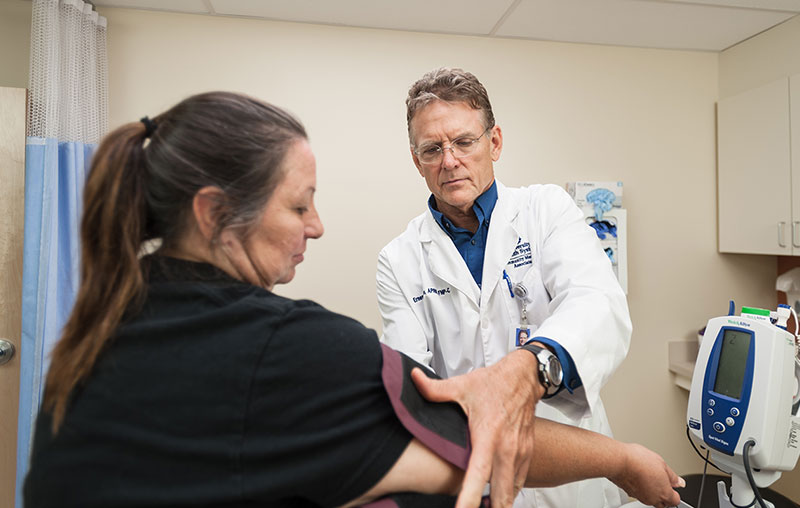Prenatal Care
What Is Prenatal Care?
Prenatal care is a type of health care a pregnant woman and her baby get before the baby is born. It keeps both mom and baby healthy before, during and after birth.
Prenatal care can prevent birth defects in babies, and helps prevent pregnant women from getting sick or injured before or during childbirth.
Women who do not receive prenatal care are at a higher risk for complications like gestational diabetes and preeclampsia (high blood pressure during pregnancy).
Babies born to mothers who do not receive prenatal care are three times more likely to have low birth weight and experience birth complications. About 1 in 7 infants in Bexar County are born to women receiving late or no prenatal care.
When Do I Need Prenatal Care?
Ideally, prenatal care starts before you even get pregnant. If that’s not possible, it’s best to start seeking prenatal care as soon as you know you are pregnant. Getting regular checkups throughout your pregnancy will help monitor your overall health and spot any issues that need to be addressed.
Where Can I Get Prenatal Care?
You can get prenatal care at regular checkups with your health care provider at a doctor’s office. Schedule an appointment online with a University Health OB/GYN.
What to Expect at Prenatal Appointments
What happens at your prenatal appointments will depend on how far along you are in your pregnancy. If possible, bring a support person to these appointments and a list of questions to help you get the most out of these visits.
First Trimester
At your first prenatal care visit, your health care team will confirm your pregnancy with a blood or urine test. Then, they may perform a physical and pelvic exam and provide educational materials about how to have a safe and healthy pregnancy.
You may get an ultrasound to estimate baby’s due date.
Your doctor will recommend you stop smoking, drinking and using substances, to support your health. If you are considering making a change, your care team can help.
You will schedule your next prenatal appointment for one month from this appointment.
Second Trimester
In the second trimester (13 to 26 weeks) you will visit your doctor once every four weeks.
Starting at your second visit, your doctor will monitor:
- Your weight
- Your blood pressure
- Your baby’s position and heartbeat
At 20 weeks, your team will perform another ultrasound to check baby’s development and position.
Third Trimester
In the third trimester (27 weeks to 36 weeks) you will visit your doctor every two weeks. Your health care team will check your vitals and baby’s position and heartbeat.
As your due date approaches (36 weeks to delivery), you will visit your care team every week. They will monitor baby’s position, heartbeat, movements and contractions.
How Often Do I Need Prenatal Visits?
Everyone is different, and some women with high-risk pregnancies may need more frequent prenatal visits. Typically, women ages 18 to 35 with no pre-existing health conditions will follow this prenatal appointment schedule:
- Conception up to 27 weeks: Once a month
- 27 to 36 weeks: Every two weeks
- 36 weeks to delivery: Weekly
Tips for a Healthy Pregnancy
Keep these prenatal health tips in mind for a healthy pregnancy and birth:
- Maintain a healthy weight before pregnancy.
- Obesity can increase a baby’s risk of congenital heart defect by 15%.
- Eat a nutritious diet.
- Most pregnant women only need about 300 extra calories per day during the last six months of pregnancy.
- Eating fruits and vegetables lowers risk of gestational diabetes by 26%
- Stay active.
- Aim for at least 150 minutes of physical activity each week.
- Physical activity can reduce:
- Risk for preeclampsia
- Risk for having a cesarean section
- Length of labor and recovery
- Take folic acid and prenatal vitamins.
- 400mcg of folic acid daily can reduce the risk of major birth defects by 28%-35%.
- Quit smoking and/or drinking.
- Smoking cigarettes and drinking alcohol both increase your risk for premature birth, miscarriage and birth defects.
Texas Prenatal Care Statistics
According to the Texas Department of Health and Human Services:
- In 2021, 69% of live births in Texas were to women who received prenatal care in the first trimester.
- In 2021, 22% of live births in Bexar County were to women who did not receive prenatal care in the first trimester.
A 2023 March of Dimes report found that:
- 47% of Texas counties are defined as “maternity care deserts” compared to 33% nationally
- 20% of pregnant women received no or inadequate prenatal care, compared to 15% nationally
University Health Resources
Women’s & Children’s Hospital
University Health offers care before, during and after your pregnancy. This includes programs and resources that protect you and your baby’s health.
The Women’s & Children’s Hospital offers:
- Spacious labor and delivery suites
- Large postpartum rooms
- Customized nutrition for newborns
- Advanced maternal and neonatal care in warm and welcoming spaces
- High-risk pregnancy care from experts who monitor your pregnancy and delivery
- NICU for babies born too early or with special medical needs
- A Mother’s Place provides breastmilk storage, customized infant nutrition, lactation support and pumping stations for new moms
- Breastfeeding classes and lactation support
- 24/7 center for OB/GYN emergencies
The Women’s & Children’s Hospital was named a 2024 High Performing Maternity Care Hospital by U.S. News & World Report. Plus, Newsweek included University Hospital on their list of Best Maternity Hospitals in 2022 and 2023.
Women’s Health Clinics
University Health women’s health clinics are located across San Antonio. We provide:
- Free pregnancy tests
- Mammograms
- Gynecology services
- Heart care
Thriving Texas Families
The Thriving Texas Families program supports mothers and caregivers with personalized guidance and tailored service plans to promote healthy pregnancies and improve childbirth outcomes.
Through counseling, care coordination and educational resources, the program connects participants to essential prenatal, perinatal and postnatal services, empowering them to make informed decisions. It also offers referrals to social services to help reduce financial stress, promote family stability, and provide classes on pregnancy, parenting, life skills and employment readiness.
Eligible participants include Texas residents who are pregnant, expecting a baby, approved to adopt an unborn child, are parents or legal guardians of pregnant minor or caregivers of children three years and under. Parents who have miscarried or lost a child within the last 90 days are also eligible.
For more information, call 210-358-3575 or email ThrivingTexasFamilies@uhtx.com.
CenteringPregnancy Group
The CenteringPregnancy prenatal care program brings together a group of expectant moms who will deliver around the same time. The group classes are led by a certified nurse midwife who can answer questions and provide guidance leading up to the birth.
Nurse-Family Partnership
The Nurse-Family Partnership program helps moms have healthy pregnancies by connecting them with a dedicated nurse. First time moms receive continued assistance until their child is 2 years old.
Baby Bexar Program
Baby Bexar is a program dedicated to improving maternal and infant health outcomes. This program provides personalized prenatal care support through an integrated approach that combines community-based social service organizations and nurse case management.
Eligibility Criteria:
- You should be 16 - 32 weeks pregnant
- Receiving care at a University Health clinic
- Planning to deliver at University Health Women’s & Children’s Hospital.
- Meet medical eligibility requirements*
*Medical eligibility criteria for the Baby Bexar program are outlined in our benefits guide. For more information, email Baby.Bexar@uhtx.com.
CareforMom Program
The CareforMom Program covers medical services for women who have given birth at University Health. CareLink automatically enrolls moms with no financial obligation and issues a CareforMom member card.
Membership starts the day after your baby is born and lasts for 12 months.
Mommies Program
The Mommies Program supports women with substance use disorder who are pregnant. The program provides:
- Prenatal care
- Doula services
- Methadone or buprenorphine treatment and recovery options
- Peer support
- Education
Healthy Texas Women
Healthy Texas Women offers free women’s health and family planning services to low-income women. Services include health screenings and treatments before, during and after your pregnancy.
Community Resources
San Antonio Healthy Start
The City of San Antonio Metropolitan Health District offers Healthy Start, a prenatal health and pregnancy program for eligible families. Healthy Start provides:
- Infant health screenings
- Doula services for high-risk pregnancies
- Lactation support
- Parenthood education
Call 210-207-4725 to see if you are eligible.
Family Violence Program
Family Violence Program is a free resource through the Texas Health and Human Services Commission. This program helps pregnant women affected by family violence. It also supports single mothers and other adults and children.
Pregnancy Hotline
The American Pregnancy Hotline provides free, confidential support to individuals with questions about pregnancy. Call 866-942-6466 for more information.
Latched Support Inc.
Latched Support Inc. provides information on pregnancy, breastfeeding, parenting and car seat safety. They provide a comprehensive education approach on essential topics such as prenatal care, childbirth readiness, postpartum care, etc.
San Antonio Birth Doulas
San Antonio Birth Doulas provide new and expecting parents with support in areas of pregnancy, labor, breastfeeding, newborn care and bonding.
Knowing your risk factors before pregnancy is key to a healthy journey.
Take our Prenatal Health Risk Assessment to better understand your risk for a high-risk pregnancy, so you can plan for a safe pregnancy and healthy baby.



